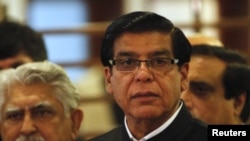ISLAMABAD —
Despite the outrage over the Taliban's shooting of teenage activist Malala Yousafzai, Pakistan's government has failed to gather enough support for a military operation against the extremists believed to be behind the attack.The political divisions in Pakistan over what to do with militants living within its borders remain as strong as ever despite the national shock over the attack.
Days after thousands of Pakistanis rallied in support of the gravely wounded Malala Yousafzai, political leaders continue to squabble over what to do about the Taliban militants behind the attack.
Prime Minister Raza Pervez Ashraf on Thursday insisted terrorism had to be eliminated.
He says, terrorism has left thousands of victims and all Pakistanis need to fight the extremist mindset that is destroying Pakistan from within.
The ruling People’s Party this week tried to table a resolution in Parliament referring to a military operation in Waziristan. The tribal region is the stronghold for a number of extremist militant groups, including al-Qaida and the Pakistani Taliban who attacked Yousafzai.
Opposition party leaders and the head of one of Pakistan’s major Islamic parties, Maulana Fazlur Rehman, shot the idea down.
Pakistan Muslim League-Nawaz representative Saddiq ul-Farooq said his party refused to back the move because such an operation now would displace millions and push the extremists to more violence.
"We have to deal with this issue with reason, not with military might, military might will be part of that reasonable formula - that if by presenting them very acceptable positive and constructive conditions, if they don’t come to terms, then we can use force," ul-Farooq stated.
For ul-Farooq, the presence of international forces in Afghanistan and the Pakistani government’s position as an official ally of the United States is inciting attacks on Pakistani soil.
He says once U.S. and coalition troops leave Afghanistan, the Pakistan Taliban will no longer have a reason to attack.
Analyst Ayesha Siddiqa says despite the shock of the attack on Malala Yousafzai there is no agreement between the government and the opposition on a consensus to fight the militants.
What resulted, she says, is not much more than political melodrama.
“What is not happening here, is people coming together and saying, whatever the source of violence, we have to put an end to it. We have to put an end to sacrificing our soldiers, our children, our men and women. That is not happening,” said Siddiqa.
So far, Interior Minister Rehman Malik has announced a $1 million bounty for the Pakistani Taliban’s main spokesman Ehsanullah Ehsan, who announced the Taliban was responsible for the attack on 14-year-old Yousafzai.
Her alleged attacker had been detained by the military during a large offensive against the Taliban in the area in 2009. He was subsequently let go because of a lack of evidence tying him to the extremist group.
Yousafzai was shot in the head October 9, on her way back from school in Pakistan’s Swat valley region.
Doctor's in the British hospital where she is recuperating say they are optimistic about her recovery.
Days after thousands of Pakistanis rallied in support of the gravely wounded Malala Yousafzai, political leaders continue to squabble over what to do about the Taliban militants behind the attack.
Prime Minister Raza Pervez Ashraf on Thursday insisted terrorism had to be eliminated.
He says, terrorism has left thousands of victims and all Pakistanis need to fight the extremist mindset that is destroying Pakistan from within.
The ruling People’s Party this week tried to table a resolution in Parliament referring to a military operation in Waziristan. The tribal region is the stronghold for a number of extremist militant groups, including al-Qaida and the Pakistani Taliban who attacked Yousafzai.
Opposition party leaders and the head of one of Pakistan’s major Islamic parties, Maulana Fazlur Rehman, shot the idea down.
Pakistan Muslim League-Nawaz representative Saddiq ul-Farooq said his party refused to back the move because such an operation now would displace millions and push the extremists to more violence.
"We have to deal with this issue with reason, not with military might, military might will be part of that reasonable formula - that if by presenting them very acceptable positive and constructive conditions, if they don’t come to terms, then we can use force," ul-Farooq stated.
For ul-Farooq, the presence of international forces in Afghanistan and the Pakistani government’s position as an official ally of the United States is inciting attacks on Pakistani soil.
He says once U.S. and coalition troops leave Afghanistan, the Pakistan Taliban will no longer have a reason to attack.
Analyst Ayesha Siddiqa says despite the shock of the attack on Malala Yousafzai there is no agreement between the government and the opposition on a consensus to fight the militants.
What resulted, she says, is not much more than political melodrama.
“What is not happening here, is people coming together and saying, whatever the source of violence, we have to put an end to it. We have to put an end to sacrificing our soldiers, our children, our men and women. That is not happening,” said Siddiqa.
So far, Interior Minister Rehman Malik has announced a $1 million bounty for the Pakistani Taliban’s main spokesman Ehsanullah Ehsan, who announced the Taliban was responsible for the attack on 14-year-old Yousafzai.
Her alleged attacker had been detained by the military during a large offensive against the Taliban in the area in 2009. He was subsequently let go because of a lack of evidence tying him to the extremist group.
Yousafzai was shot in the head October 9, on her way back from school in Pakistan’s Swat valley region.
Doctor's in the British hospital where she is recuperating say they are optimistic about her recovery.





